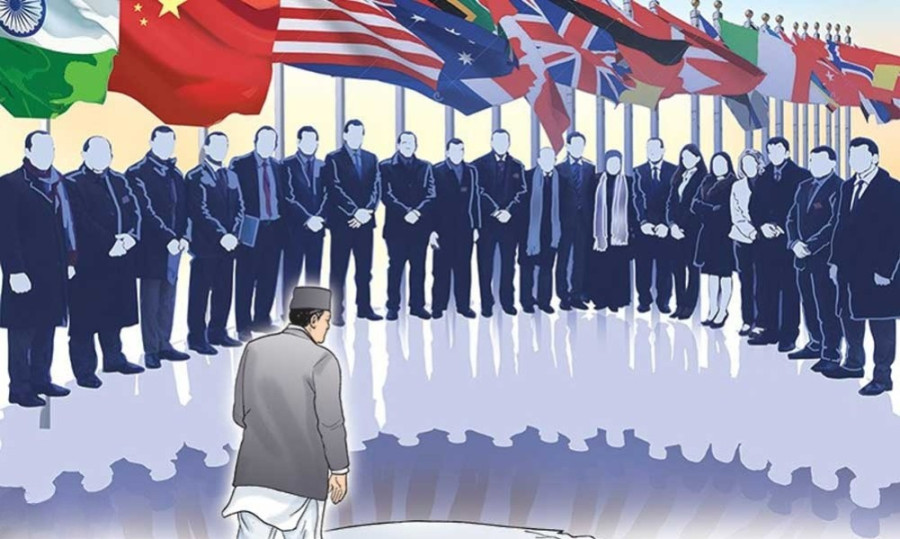Columns
Strategic neutrality in an uncertain world
Its adoption empowers small states like Nepal to navigate disorder with agency rather than passivity.
Pawan Adhikari
The end of the Cold War in 1990 inspired the vision of global collaboration and victory of a liberal triumph—free markets, open borders and the global spread of democracy. Yet, the reality today is very bleak. Protectionist tariffs have returned, long-standing defence alliances are in crisis, regional trade agreements are fractured and wars look imminent. The North Atlantic Treaty Organisation, an international military alliance of 32 member states, is debating burden sharing; AUKUS, a trilateral security partnership between Australia, the United Kingdom, and the United States, has sparked regional unease and the Quadrilateral Security Dialogue’s coherence is being tested by diverging strategic priorities. Foreign policy feels confrontational, transactional and unpredictable everywhere.
With this unprecedented crisis, the survival discourse for small states has reemerged with renewed urgency. The reality of great-power aggression—Russia’s invasion of Ukraine, China’s assertiveness in its neighbourhood, the US’s unreliability as a security/development partner and the ineffectiveness of instruments of global governance—has forced small states to confront existential dilemmas. Who can they trust? How can they avoid becoming entangled in power struggles that threaten their sovereignty?
Case for Nepal
Sandwiched between two superpowers, India and China, Nepal faces a predicament. Indian markets account for almost half of its exports, while Chinese investments are becoming more prominent. However, Kathmandu’s foreign policy has too often been swayed by domestic politics. The tides swing each election cycle, foreign policy discourses are politicised, negotiations are villainised for electoral purposes and the details are often lost in translations. Such politicisation reduces the nation’s credibility, invites external manipulation via state and non-state actors and compromises Nepal’s ability to chart its independent foreign policy course.
In this environment, neutrality must be reinvented. Strategic neutrality is not synonymous with weakness or passivity. It is a proactive strategy that insulates a state from great‑power rivalries while preserving the freedom to engage on its terms. Nepal can only achieve this via non-politicised engagement with foreign actors, cultivating a national consensus on foreign policy and building resilience in critical sectors.
Depoliticisation of foreign policy
Non‑politicised engagement begins with a firm commitment to remain at the negotiation table. Nepal should actively engage all its geopolitical stakeholders, India, China, the US and multilateral institutions, on projects and policies that advance Nepal’s national interests. It must adopt a path that ensures no single external actor wields undue influence while also avoiding the use of 'great-power terminologies' often employed to criticise one another.
Instrumentalising foreign agreements for electoral gain or framing international cooperation as partisan victories or defeats does more harm than good. Efforts to villainise any foreign actors will weaken the state’s credibility and negotiations. By depoliticising these engagements, Nepal can demonstrate reliability and consistency. This is more crucial in a world of transactional alliances.
Domestic consensus is the bedrock of credible foreign policy. States like India and the US have shown how bipartisan or cross‑administration continuity on core strategic issues can strengthen a country’s negotiating position. Nepal can institutionalise this principle by establishing a National Foreign Policy Council that creates a permanent forum bringing together parliamentarians, experts and civil society representatives to review and endorse major diplomatic decisions.
Resilience in critical sectors
Resilience in critical sectors is the final pillar of strategic neutrality. Regular audits of Nepal’s dependencies in crucial areas such as food, medicine, energy and technology are essential. Diversification of strategies with multiple suppliers, improvement of domestic production capabilities and prioritisation of foreign investments will benefit Nepal in the long run. At the same time, the state should employ public-private partnerships to finance infrastructure, leverage the diaspora’s rising capacity and expertise and develop strategies to retain its human resources via education system reform. These measures can improve Nepal’s autonomy by addressing vulnerabilities external actors might exploit.
The experiences of other small states could provide vital learning lessons for Nepal. Finland maintained its non‑alignment during the Cold War through a combination of credible defence readiness and careful diplomacy. Despite its size, Singapore could negotiate its place by embracing economic openness and avoiding alignment in military blocs. Both cases demonstrate that neutrality, paired with credible self-defence and economic diversification, can improve a nation’s autonomy and resilience.
Small states like Nepal cannot afford inaction. Without a consistent strategy, they risk becoming areas of proxy competition. The impacts could be stalled infrastructure projects due to competing interests, political leaders and elites divided over allegiances to external patronage and sovereignty compromised by unsustainable debt.
Conclusion
The current shift of world order suggests that alliances are temporary and small states must reclaim agency. Strategic neutrality—anchored in non‑politicised engagement, domestic consensus and calibrated self‑reliance—offers a lifeline. For Nepal, this means staying at the table for negotiation, ensuring that foreign policy doesn’t become a partisan issue, and investing in capacities safeguarding independence. Far from retreating into isolation, strategic neutrality equips small states to defend their interests, maintain sovereignty and chart their destinies.




 8.22°C Kathmandu
8.22°C Kathmandu















